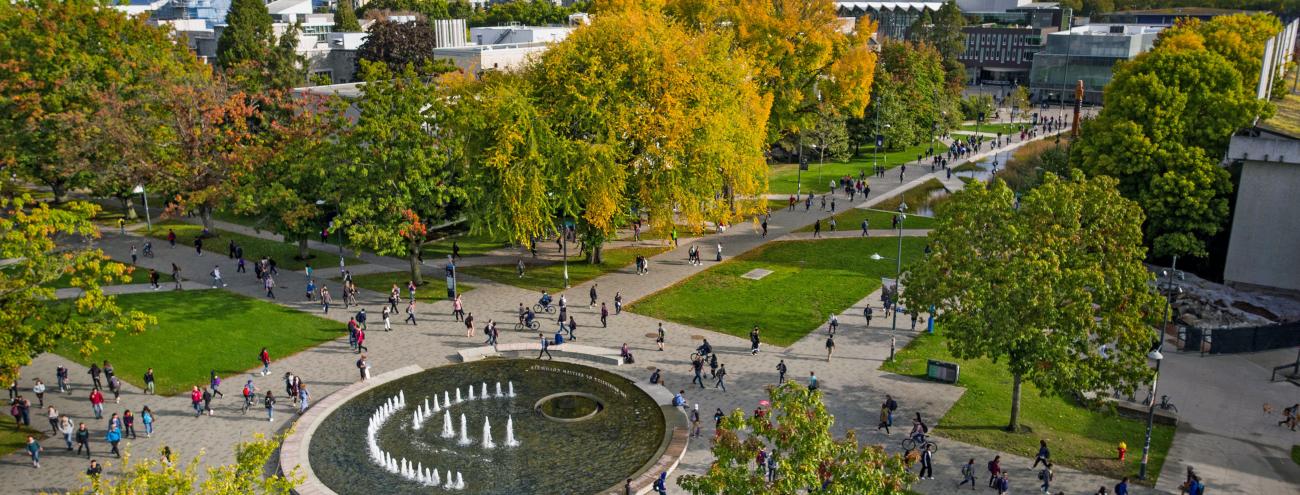
This visionary 2023 Grand Challenge Winning Project aims to develop a resilience hub framework to strengthen community connections and emergency support, and to create a disaster risk reduction roadmap to improve UBC’s operational response to climate emergencies. We sat down with the talented and diverse project team to learn more about their work.
Interviewees:
- Stephanie Chang, Professor, School of Community and Regional Planning (SCARP) and Institute for Resources, Environment and Sustainability (IRES)
- Hailey Maxwell, Manager, Emergency Management & Continuity Planning
- Steven Weijs, Associate Professor, Department of Civil Engineering
- Sara Shneiderman - Associate Professor, School of Public Policy & Global Affairs (SPPGA) and Department of Anthropology
- Amy Kim, Associate Professor, Department of Civil Engineering
- Jocelyn Stacey, Associate Professor, Allard School of Law
- Carlos Molina Hutt, Assistant Professor, Department of Civil Engineering
- Michael Hooper, Associate Professor, School of Community and Regional Planning (SCARP)
Q: What previous work inspired the development of the Resilience Hubs at UBC?
Stephanie: The concept of resilience hubs is something that many cities in North America have been adopting recently; and we thought this would be a great opportunity to bring research and practice together for the benefit of our campus communities. UBC has a lot of fantastic researchers who are looking at issues of disaster risk and resilience from different perspectives.
Sara: The UBC Disaster Resilience Research Network (DRRN) is excited about this collaboration. The network facilitates transdisciplinary research between faculty, post-doctoral fellows, and graduate students from a diversity of units at UBC including Civil Engineering; Community and Regional Planning; Architecture and Landscape Architecture; Geography, Anthropology; Law; Earth Ocean and Atmospheric Sciences; and Forestry; in conjunction with external partners who are practitioners in the disaster resilience field. Participation in the Resilience Hubs project provides an opportunity for members to conduct research together in our home campus environment, along with operational staff and students at UBC.
Q: From your perspective, why is this initiative critical locally and globally?
Mike: Campuses are jurisdictionally complex environments, typically combining a degree of institutional autonomy with dependence on diverse levels of government. While the university’s autonomy brings benefits, in a disaster the need to collaborate with different levels of government and a wide array of partners – from community groups to First Nations – could pose an extreme challenge.
Jocelyn: BC recently enacted a new framework for governing emergencies across the province (Emergency and Disaster Management Act). This law is distinct from emergency laws across the country: it recognizes the inherent jurisdiction of BC First Nations and represents an important first step in aligning emergency management with the UN Declaration on the Rights of Indigenous Peoples, it incorporates climate change into emergency planning requirements, and it demands a high degree of coordination across governments and agencies. This is an important moment for UBC to lead the rest of the province – and the country – by showing how multi-disciplinary research can produce community-supporting, collaborative models for emergency management in the era of climate change.
Q: How does this project align with and support UBC’s long-term planning?
Hailey: UBC Emergency Management is engaged in the Campus Vision 2050 planning process as well as the Neighbourhood Climate Action Planning process, both of which are informing how we build readiness and resilience for campus densification and climate intensification.
Carlos: In 2017, UBC carried out a seismic risk assessment of its approximately 330 existing buildings and distributed utility infrastructure on campus. The results were used to develop a strategy to ensure life-safety, mitigate disruptions and ensure business continuity for the university. In light of the Campus Vision 2050 Plan, our current CLL project presents a great opportunity to link the lessons learned from past seismic studies on campus with this new effort to enhance UBC campus resilience to climate-related hazards and proactively prepare for such emergencies.
Q: What outcomes do you hope will result from this project?
Stephanie: In the short term, my hope is that some of the research findings will directly inform how UBC operationally prepares for emergencies. I’m hoping that the work of the research team can provide detailed data, analysis, and insights to replace (or at least supplement) the broad-brush assumptions that emergency managers often have to make, for example, about how many people might need what kinds of support in an emergency. In the longer term, I hope the project will help strengthen UBC’s capacity for applied research to help build more disaster-resilient communities outside of the UBC campus.
Amy: There is a rich research literature on how to assess urban transportation systems towards understanding their strengths and vulnerabilities specifically in disaster situations; we aim to apply these existing tools, combined with new ideas co-developed with the project team, towards an assessment of the UBC transportation network.
Steven: Resilience of our water supply against shocks and stresses is critical to overall resilience against climate related disturbances. In this research we are aiming to apply a new framework for quantifying resilience to investigate the performance of water supply to campus under various scenarios.
Hailey: Emergency management data and research specific to the UBC campus, and reflective of the unique risk and vulnerabilities of our context, can be hard to come by; more often it is regional data that we can access. The advantages that our operational planning will gain from the focus of the CLL research on the challenges of our campus are immeasurable. The course that we chart for UBC’s Emergency Management program over the next decade will be a more focused and forward-looking effort because of our CLL collaboration.